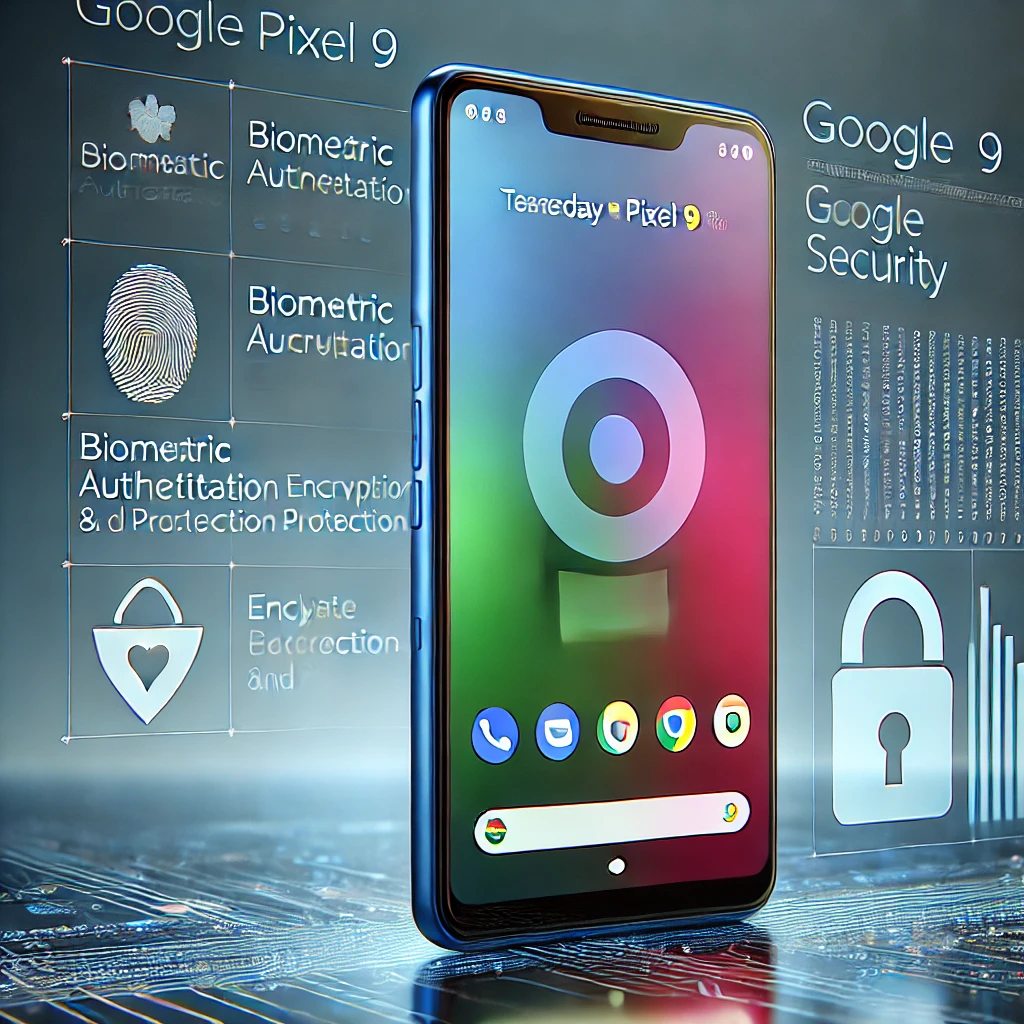In today’s digital landscape, smartphone security is paramount. As personal and sensitive data increasingly flows through mobile devices, ensuring that phones like the Google Pixel 9 are fortified against cyber threats is crucial. Google’s Pixel lineup has long been recognized for its robust security features, and the Google Pixel 9 takes that legacy to new heights. This article dives deep into the advanced cybersecurity measures of the Google Pixel 9, offering insights into its features and why it’s a top contender in the world of secure smartphones.

The Role of Titan M2 Chip in Google Pixel 9 Security
One of the standout security features of the Google Pixel 9 is the Titan M2 security chip. This chip builds on the success of its predecessor, the Titan M, and has been engineered specifically to bolster protection at the hardware level. Hardware-based security is critical as it forms the first line of defense against potential exploits. The Titan M2 chip provides multiple layers of security:
Encryption of sensitive data: The Titan M2 is responsible for ensuring that sensitive data such as passwords, biometric information, and other personal data remain encrypted and inaccessible to unauthorized parties.
Boot process integrity: The chip ensures that the phone’s operating system boots in a secure manner by verifying the integrity of the system. This is achieved through Verified Boot, which checks the phone’s operating system and prevents tampering or unauthorized changes.
Protection against hardware-level attacks: Physical attacks where hackers try to bypass software security by directly accessing hardware components are becoming more common. The Titan M2 has been built to withstand such attacks.
Android 14 Security Enhancements
This focus on hardware-based security makes the Google Pixel 9 particularly resilient to sophisticated attacks that try to bypass traditional software-based defenses.
The Google Pixel 9 comes equipped with Android 14, the latest iteration of Google’s mobile operating system. While Android 14 boasts numerous user experience improvements, its security enhancements are some of the most notable. Here’s how Android 14 improves cybersecurity on the Pixel 9:
Enhanced Permission Controls: Users now have more granular control over app permissions. With Android 14, apps are required to request permissions for location tracking, camera access, and microphone access only when absolutely necessary, reducing the potential for malware or spyware to exploit these resources.
App Hibernation: Android 14 introduces the ability to automatically hibernate apps that haven’t been used for an extended period. This feature limits background processes and reduces the attack surface of inactive apps that could potentially become entry points for malicious software.
Improved Biometric Authentication: The Pixel 9’s biometric authentication system is tied into Android 14’s improved APIs, ensuring that fingerprint and face recognition systems are faster and more secure. The data generated by these systems is securely stored and processed on the Titan M2 chip, ensuring that even a compromised operating system cannot access this sensitive information.
Privacy Dashboard: Android 14 continues to build on the Privacy Dashboard introduced in previous versions, offering users a clear view of which apps have accessed sensitive permissions (like location or camera) over a given period. This transparency is essential for identifying suspicious app behavior quickly.
These features underscore Google’s commitment to ensuring the Pixel 9 remains secure from emerging threats.
Built-In VPN and Data Encryption
In an age of increasing digital surveillance and data breaches, the Pixel 9 incorporates a Google One VPN service that protects users from man-in-the-middle attacks when they connect to unsecured Wi-Fi networks. This VPN helps to encrypt internet traffic, ensuring that any data sent or received by the Pixel 9 is secure, even on potentially compromised networks.
Additionally, Google Pixel 9 offers end-to-end encryption for most user communications, including phone calls and text messages through RCS (Rich Communication Services). This means that even Google cannot access the content of these communications, providing a high level of privacy for users.
Anti-Malware Protections and Google Play Protect
Google’s Play Protect is one of the most advanced mobile anti-malware systems available today, and it plays a significant role in keeping the Pixel 9 secure. Play Protect automatically scans apps in the Play Store and the ones installed on the device for malicious software, alerting users if any suspicious activity is detected.
Continuous Monitoring: Google Play Protect is continuously active, analyzing app behavior in real-time. It uses machine learning algorithms to identify and isolate suspicious patterns that could indicate malware.
App Verification: Apps downloaded from the Play Store are verified before they are installed, ensuring that they have not been tampered with and do not include hidden malicious code.
Protection against harmful sideloaded apps: While Android users can sideload apps from outside the Play Store, Play Protect will alert users if any sideloaded app appears harmful or behaves suspiciously. This level of scrutiny makes it harder for malware to gain a foothold on the Pixel 9.
Regular Security Updates and Patches
One of the most critical aspects of maintaining smartphone security is the frequency and reliability of security updates. Google has long been praised for its commitment to delivering monthly security patches, and the Pixel 9 is no exception. These patches address vulnerabilities discovered in the Android operating system and the Pixel hardware.
Moreover, the Pixel 9 benefits from long-term software support. Google promises security updates for at least five years, ensuring that the device remains protected against new and evolving threats throughout its lifecycle. This commitment to regular updates places the Pixel 9 among the most secure devices on the market.
Advanced Anti-Phishing Protections
Phishing attacks are one of the most common forms of cyberattacks, where hackers attempt to trick users into providing sensitive information by disguising themselves as legitimate services. Google Pixel 9 integrates advanced anti-phishing mechanisms that go beyond traditional email filtering:
Safe Browsing: The Pixel 9 uses Google’s Safe Browsing technology, which warns users if they attempt to navigate to a website known to harbor phishing scams or malware. This feature is continuously updated as new threats emerge.
AI-Powered Detection: The Pixel 9’s AI systems analyze text messages and emails for phishing indicators. If a suspicious link is detected, the device will alert the user before they interact with it.
Spam and Phishing Alerts in Google Messages: Google’s default messaging app is capable of detecting phishing and spam messages, alerting users to potential scams and filtering them into a separate inbox.
These comprehensive phishing protections help prevent users from inadvertently falling victim to attacks that could compromise their personal data.
Zero Trust Architecture in Google Pixel 9
With cyber threats constantly evolving, Google has adopted a zero trust architecture for its Pixel devices, including the Pixel 9. Zero trust means that no part of the device or its network is inherently trusted. Every request for data access, whether internal or external, is thoroughly authenticated, authorized, and encrypted.
Device Attestation: Before allowing any app or service to access sensitive data, the Pixel 9 performs device attestation to verify the integrity of the device. This process helps to ensure that the device has not been compromised or rooted.
Multi-Factor Authentication (MFA): While multi-factor authentication is commonly associated with cloud services, the Pixel 9 also supports MFA for local authentication, adding an extra layer of security for sensitive actions on the device.
Zero trust architecture represents a shift in how cybersecurity is approached, and the Pixel 9 is at the forefront of this movement.
Security Against Emerging Threats: Quantum-Resistant Encryption
As quantum computing continues to evolve, it poses a potential threat to modern encryption standards. Recognizing this, Google has begun to explore quantum-resistant encryption techniques for future-proofing devices like the Pixel 9. While full quantum resistance may still be years away, Google is laying the groundwork by ensuring that the Pixel 9 is protected against emerging post-quantum threats.
Post-Quantum Cryptography Research: Google has integrated elements of its research into the Pixel 9’s encryption protocols, ensuring that even as quantum computing capabilities develop, user data remains secure.
This future-facing approach sets the Pixel 9 apart from competitors and ensures it will remain a secure option for years to come.
Conclusion: Google Pixel 9 – A Stronghold in Smartphone Security
The Google Pixel 9 stands as a testament to Google’s unwavering commitment to cybersecurity. Through the integration of hardware-based protections like the Titan M2 chip, continuous software updates, advanced malware defenses, and a zero-trust security model, the Pixel 9 is one of the most secure smartphones available in 2024.
For users who prioritize the security of their personal data and communications, the Pixel 9 offers peace of mind with cutting-edge technologies designed to fend off the most sophisticated cyber threats. As cyberattacks grow more complex, the Pixel 9’s robust security features ensure that users are always a step ahead, protected in a digital world filled with ever-evolving dangers.



























